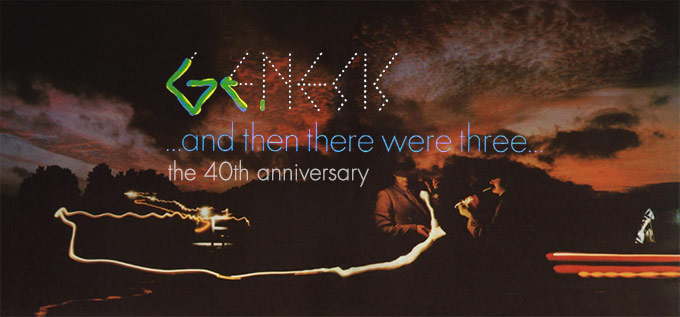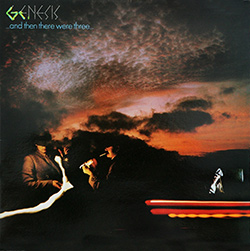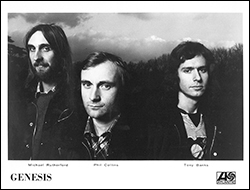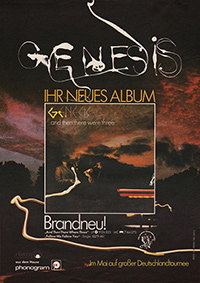


When I discovered the music of Genesis in the early 90's and started spending my pocket money on their LPs and, increasingly, CDs, And Then There Were Three was one of the last gaps in my collection. It may well have been that it was the last album I bought from their back catalogue – even after Genesis Live (1973). The artwork did not do much for me. When I listened to the album, I was not impressed either. As time went by I came to like some songs, some bits here, some of the lyrics there, but the album as a totality left me cold. Forty years have passed since its release, some twenty-five since I have bought it myself. Time for a reassessment.
Genesis in 1977 are a changing band. They have coped well with Peter Gabriel's departure, going strong as a foursome with A Trick Of The Tail and Wind & Wuthering. After their tour has ended in Munich Genesis begin to mix their second live album, Seconds Out. It is at this time that Steve Hackett leaves the band. Genesis shrink to a trio. Banks, Collins and Rutherford have already begun playing the second half of The Cinema Show as a threesome back in 1973/4, but now the trio becomes the official line-up. Mike Rutherford has to play the lead guitar even though he is not really prepared for it. Mike himself does not sugar-coat the facts either: “I managed to scrape through the lead part, just. … The album did suffer.” [C&V, ch.9]
Phil Collins is also asleep at the wheel, as it were. His wife Andrea is sitting a home taking care of their children. She expects him to spend more time with the family, while Phil focuses on his professional career. Their marriage will break up within the year and Andrea will move to Canada with the children. “I look into Simon's cot and think, 'You have no idea what's happening.' When I think about it, neither do I”, is the way Phil describes it and adds: “The way it's looking, we're all going to be disappointed. Genesis' success is conspiring against us.“ [NDY, ch.8]
The three musketeers go into the studio. Into one of the most modern studios in the small Dutch town of Hilvarenbeek near the border to Belgium. They have recorded Wind & Wuthering there, so the return to a familiar place (and save on taxes). They select eleven songs from the songs they bring to the studio and from those that they write there, and choose a groaner of a title, And Then There Were Three. Why? Mike Rutherford recalls that they were asked this question in an interview in New York: “'So, tell me: why's the album called And Then There Were Three?' I could tell it was going to be a long haul. This was in March 1978 and we were in a radio studio in New York at the start of almost a year of touring. Tony, Phil and I. The three of us. Maybe the DJ had a problem counting.” [LY, ch.12]
 The cover shows – a first for a Genesis studio album – only a photo, albeit an artistically modified one. “The problem with covers was that they'd always end up being rushed. You couldn't decide on a cover until you knew what the songs were going to be about, and then you'd only get a limited time to come up with something before the record was released. A prime example was And Then There Were Three, our last Hipgnosis cover. It was definitely one of Storm [Thorgerson's] B-ideas.” [LY, ch.13] Thorgerson himself does not beat about the bush: “That one's a failure.” He explains the idea behind it: “We were trying to tell a story by the traces left by the light trails. It was a torch, a car, and a man with a cigarette. The band was losing members and there were only three of them left. The lyrics of the songs were about comings and goings and we tried to describe this in photographic terms by using time-lapse. So there's a car going off to one side and then the guy gets out of the car, walks over to the front of it, and lights a cigarette. But as he walks he uses a torch and the car he was in leaves. There's a trail left by the car, a trail left by him as he's walking and then he lights a cigarette, which on the cover is where there's a flash of his face.” [ST]
The cover shows – a first for a Genesis studio album – only a photo, albeit an artistically modified one. “The problem with covers was that they'd always end up being rushed. You couldn't decide on a cover until you knew what the songs were going to be about, and then you'd only get a limited time to come up with something before the record was released. A prime example was And Then There Were Three, our last Hipgnosis cover. It was definitely one of Storm [Thorgerson's] B-ideas.” [LY, ch.13] Thorgerson himself does not beat about the bush: “That one's a failure.” He explains the idea behind it: “We were trying to tell a story by the traces left by the light trails. It was a torch, a car, and a man with a cigarette. The band was losing members and there were only three of them left. The lyrics of the songs were about comings and goings and we tried to describe this in photographic terms by using time-lapse. So there's a car going off to one side and then the guy gets out of the car, walks over to the front of it, and lights a cigarette. But as he walks he uses a torch and the car he was in leaves. There's a trail left by the car, a trail left by him as he's walking and then he lights a cigarette, which on the cover is where there's a flash of his face.” [ST]
The album front does not show three people but only two. The “two” taller ones on the left-hand side is actually one and the same person who has moved between exposures. The man on the right is someone else – he's wearing a flat cap instead of a hat and appears to be sitting in the car Thorgerson mentions. A peculiar cover indeed. From Trespass up to this album, the cover art of all Genesis studio albums has always referenced the music on the album in one way or another. This brownish dark cover seems like art for art's sake without any reference to the music.
Speaking of which, the music begins with hovering keyboard sounds; freshly sensitized by Tony Banks' new album of classical music, Five, this reminds me of the ethereal sounds with which Bruckner's music often begins. At least, it does in the first half a minute of Down And Out, a song that developed in the studio, before the guitar comes in and rumbling drums anchor the song to earth. By Genesis standards it is very fidgety music, and Collins' vocals sound so hurried as if he was already late for his next appointment (but it will be a while until Hello, I Must Be Going). The rush fits the lyrics: hasty, nervous small talk, then the boss – note the working title, The Man With The Big Cigar – passes on the bad news and then “glad it's over. Cuppa coffee? Nothing personal, right?”
Undertow begins pleasantly calm and simple. Vocals and gently guitar sounds paint the picture of a cozy, warm home with heavy cold outside. The first verse could well be described as a matured version of Your Own Special Way (but it is a Banks composition). There is, however, an undertow: There are people out there who are going to be cold tonight, who may well freeze to death tonight. If you were one of them, if you only had one more day to live – what would you do? The drums come in for this question and the music becomes more lively. There is a hunch of Afterglow in the chorus that lists what you could do that last day. Listen to that and it is hard to believe when Mike Rutherford explains: “We didn't go to town on the choruses either. At the end of each one we used some voice loops which we had made but we kept it low-key and subtle. “[TBT] There used to be a long introduction to Undertow, which the band (or two-thirds of the band) did not want to have on the album; it would soon reappear on Tony Banks' solo debut A Curious Feeling. In order to make sure people notice the connection the piece has been called From The Undertow.
Apparently aimless piano chords and glimmering cymbals introduce the Ballad Of Big (working title: Ballad Of Big Jim). It is a classic western story: The notorious cowboy “Big” Jim Cooley bets that he can drive a herd of cattle “over the plain”. They leave in difficult weather. At their night camp they are all killed by a host of elite Indian warriors. Legend says his ghost still appears there. The drums drive the song along at a gallop, as it were. The verses have a simple melody with rhythmically divergent passages inserted (“must be mad …”). Keyboards dominate this song, with hardly any guitar to be heard except for a few sparkles here and there.
Apart from the (synth) flute sounds, Snowbound begins like Undertow: Gentle vocals with much vibrato and soft guitars. Both songs deal with the winter. But Tony Banks has not copied his song, for Snowbound is one of Mike's. It looks at the pretty sides of winter. The bombastic chorus celebrates a snowman, while the verses speak of all the joy the children have in the winter weather. But, again, there is an undertow to all that joie de vivre, for “they say a snow year's a good year filled with the love of all who lie so deep.”
After an introduction of keyboard, drums and, yes, guitar, Burning Ropes begins, unusually, with the chorus. Another piece that stresses the fugaciousness of existence. Guitar and drums are a bit stronger compared to the keyboards, so there is more colour, more change in the song. Mike considers the guitar solo at the end (sic) “the best solo on the album” [TBT]. Tony is a bit more tight-lipped: “There was one guitar solo, on the song 'Burning Rope', which I had written the line for. If Steve had been playing the solo, I would probably have hoped to have gone further and expanded it, but Mike just played the notes – and it still sounds all right.” [C&V]
Rumbling drums introduce Deep In The Motherlode; for once the drums do not fade too far into the background; you can even make out some guitar sounds. The powerful beginning of this introduction explains why this song had the working title Heavy. “Go west young man” – a song ostensibly about the gold rush.
Many Too Many is my favourite song on the album. Quiet piano and synth strings accompany the vocals. Phil drums very gently and Mike gives off some lifesigns on the guitar. Between verses the song switches to “big sound” mode, like so many on this album. Mike remembers that they considered recording the song with a real orchestra but “we never got round to it” [TBT].
 The title of Scenes From A Night's Dream alludes to Shakespeare's Midsummer Night's Dream. The lyrics use some stories from Winsor McCay's Little Nemo comic strips. Its hero, Little Nemo, undergoes many bizarre adventures in Dreamland, from which he always awakes in the last image. The music is mainly by Tony Banks. “This went through a funny change. We always liked it but Tony didn't like the lyrics he had for it and went off them – more than the rest of us actually – half way through. Then Phil came back with some different lyrics, a slightly different melody and some answering harmonies. … This song is a slightly lighter element that might not have got on to the album in the normal course of events.” (Mike in a 1978 interview [TBT]).
The title of Scenes From A Night's Dream alludes to Shakespeare's Midsummer Night's Dream. The lyrics use some stories from Winsor McCay's Little Nemo comic strips. Its hero, Little Nemo, undergoes many bizarre adventures in Dreamland, from which he always awakes in the last image. The music is mainly by Tony Banks. “This went through a funny change. We always liked it but Tony didn't like the lyrics he had for it and went off them – more than the rest of us actually – half way through. Then Phil came back with some different lyrics, a slightly different melody and some answering harmonies. … This song is a slightly lighter element that might not have got on to the album in the normal course of events.” (Mike in a 1978 interview [TBT]).
Say It's Alright Joe is unlike everything Genesis have recorded so far. “It was the second to last song we recorded, the last one being a track that never even got off the ground”, remembers Mike. “This is meant to be a piss-take of the Dean Martin 'set 'em up Joe' alcoholic style.” [TBT] After one and a half minutes Tony's keyboards bulldozer away Dean Martin, the bar and all the drinks. The eruption soon subsides, though, and as if nothing had ever happened, Phil “Dean Martin” Collins sits at the bar again – until Tony's keyboard bulldozer reappears in another eruption that peters out in a long instrumental ending. A bit like the ending of Dancing With The Moonlit Knight, in fact.
The beginning of The Lady Lies is meant to be slinky”, explains Mike, and to have “a strippers feel to it.” It is the second song after the Ballad Of Big in which Genesis tell us a story. This time it is a fantasy story with allusions to the fairy-tales in which gallant knight rescue beautiful maidens from terrible monsters. The twist in this story is that the beautiful maiden happens to be the terrible monster. Can the hero escape its snares? The answer is revealed in the grand finale where the sound rises to unprecedented dimensions. Says Mike: “The ending was meant to be cacophonous with the sort of jazz style that happens when the musicians get that really happy look.” A perfect ending? Definitely a typical Genesis album ending, going out with a big band (Los Endos! Afterglow! Supper's Ready!).
Only this is not the end yet. Tony Banks remember that the most exciting moment in the studio “was when Mike played a big flanged guitar riff and started playing a few chords along to it; suddenly the combination sounded fantastic, this very simple little thing, which became 'Follow You Follow Me'. … Mike went off and wrote a very simple love song lyrics on top of it, trying not to move away from the flavour of the piece, because it was a song that made you feel warm. It was a happy song – which is something that we're not really very good at – and it needed a love lyric where everything went right. It was a whole new experience.“ [C&V] Adds Mike: „We deliberately planned to end the album on a lighter note, in contrast to our usual heavy, pompous Armageddon-here-we-come sort of thing. It's meant to be something of an afterthought. I look upon The Lady Lies as the end of the album. This is a wistful postscript.” [TBT]
 As an album, a totality, And Then There Were Three is strangely awkward. So many things appear twice here: The pattern of “quiet verse with few instruments – gigantic sound in the chorus” (Undertow, Snowbound). The lyrical idea “winter is so beautiful – but it has another side to it” (again: Undertow, Snowbound). Similar song beginnings (Burning Rope, Deep In The Motherlode). On any other album the band would have said: Okay, one of those has to go.
As an album, a totality, And Then There Were Three is strangely awkward. So many things appear twice here: The pattern of “quiet verse with few instruments – gigantic sound in the chorus” (Undertow, Snowbound). The lyrical idea “winter is so beautiful – but it has another side to it” (again: Undertow, Snowbound). Similar song beginnings (Burning Rope, Deep In The Motherlode). On any other album the band would have said: Okay, one of those has to go.
Musically, there are a number of issues: The band has lost its lead guitarist. The new lead guitarist is trying to get a grip on his new role. The drummer is preoccupied and does not introduce as many sophisticated drum fills, and the singer reaches into the highest heights of his voice. There are gaps in the music, and the keyboarder decides to stop these gaps by applying one sweet keyboard layer after the other to all the songs. Some of them, Burning Rope for example, benefit from it, and they begin to shine. Others suffocate and drown in the torrent of keyboards. Those would have been better off with a more transparent sound. And it seems there is a binary switch: piano – or the biggest possible sound with multi-layered synth strings and everything squeezed in but the keyboarder himself. There is little music that is in between those extremes on the album. That makes And Then There Were Three like a big box of chocolates for me: When I feel like it I have a chocolate or three. I enjoy them, but the whole box at once is simply too much for me.
This is the first Genesis album after a change in the line-up where the change makes a difference for the weaker. When Anthony Phillips left the band a competent guitarist took over. When Peter Gabriel left the band the drummer, who had some experience in singing (backing vocals – and lead vocals in musicals!), took over. With Steve Hackett leaving the band Mike has to learn to play lead guitar. It shows on the album: There is hardly any guitar on it, and Mike is quite honest: “[W]hen I hear it back it sounds slightly dodgy because I lacked – and consequently the album lacked – Steve's ability and his lovely way of playing, which I didn't possess. Of all our albums And Then There Were Three was the weakest, without a doubt.”[C&V]
All this makes the album a new beginning: For Genesis, this is the start of almost twenty years as a trio, a period that will bring them immense success. It is also an ending: The last album before all three embark on their solo albums (Banks, Rutherford) or start recording songs that will, eventually, become a solo album (Collins). And the time in which Genesis record songs written completely by one member is beginning to come to a close. The percentage of songs that the band write together will increase until they develop all the material together from scratch on their self-titled 1983 release.
And Then There Were Three may not be perfect as an album, but (most of) the individual songs from it are quite enjoyable. One should also note the peculiarity that in 1978, with punk shaking up the music world, with aggressive, visceral music fighting all this “romantic melodic muzak” and the pretentious offerings by album bands, Genesis, certainly an album band whose albums may be deemed pretentious offerings, go out and land their first single hit with a romantic melodic lovesong.
What remains of this album? The romantic Follow You Follow Me. Snowbound with that wonderful bit of lore about the snow years. Ballad Of Big and Scenes From A Night's Dream, two songs that stand out at least slightly from the others – the final hurrah of Genesis bombast in The Lady Lies. What else remains? Obviously, the warming sun, the cooling rain, the snowflake drifting on the breath of the breeze, the lightning bolt that clears the sky for you, yet only eagles seem to pass on through, the words of love, the cries of hate, and the band in the moon who seduced you, then finally loosed you.
